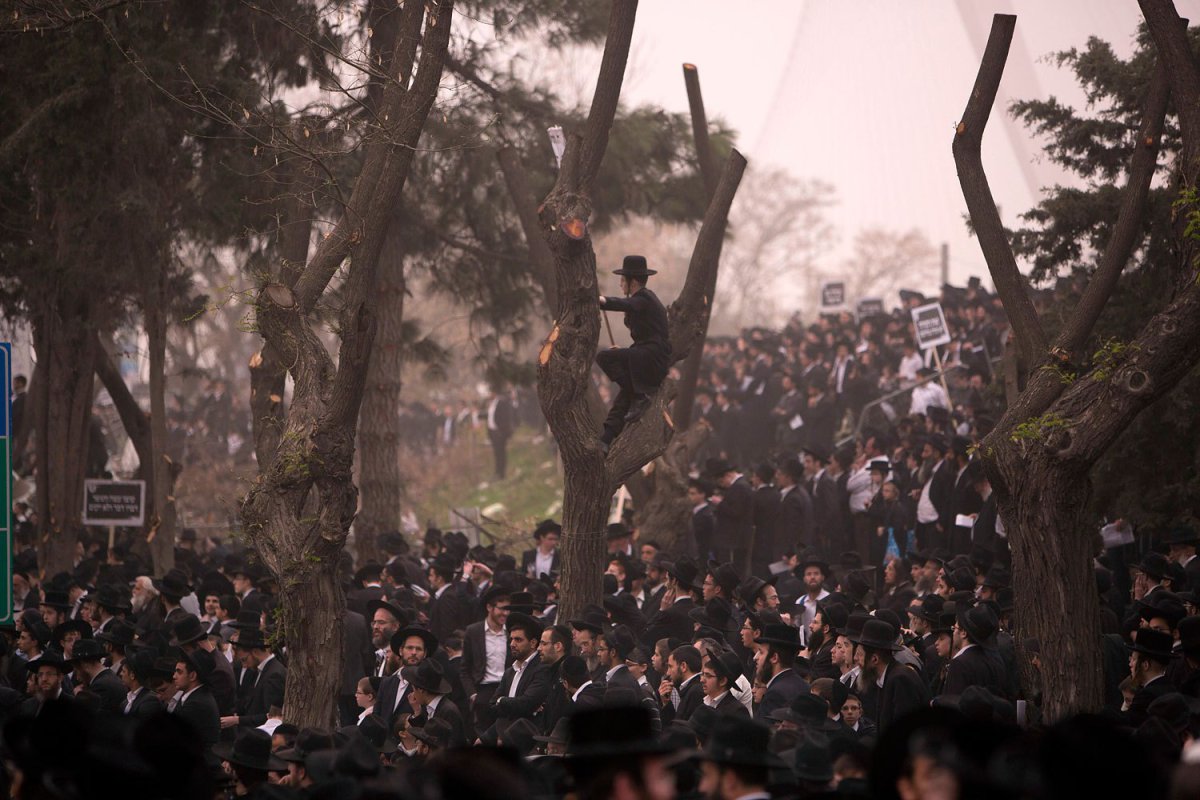
Israel’s parliament on Wednesday passed a law requiring at least some ultra-Orthodox men—strictly observant Jews known by their black fedoras and discomfort with the secular world—to serve in the national army. The controversial measure will become law with cabinet approval, which is virtually assured given the support of 67 of the 68 lawmakers who make up Prime Minister Benjamin Netanyahu’s ruling coalition.
The stated intention of the bill is to share the burden of military service equally, but it’s also aimed at preserving Israel’s economy: Military service is an established gateway to employment and currently fewer than half of ultra-Orthodox men work for a living. Jewish Israelis not protected by exceptions previously granted the ultra-Orthodox are obliged from age 18 to present themselves for military service that runs three years for men and two years for women.
Beyond the inevitable social resentments of taxpayers irked by having to support the ultra-Orthodox community, the absence of ultra-Orthodox from the workforce cost Israel’s economy more than $1.5 billion in 2010, according to the finance ministry. Known in Hebrew as haredi, or “God-fearing,” the ultra-Orthodox currently make up 10 percent of Israel’s population, but are the fastest-growing segment of the country’s population, with a birth rate of 7.1 percent (compared to 1.4 percent for other Jewish Israelis). More than half now live in poverty. The governor of Israel’s central bank recently warned that failing to integrate them into the workforce will cost the gross national product three percentage points a year.
“Listen, one in every seven 18-year-old male Israelis is haredi,” says Ofer Shelah, a leader of the centrist Yesh Atid party, which campaigned heavily on the issue in elections last year. “A third of those who entered first grade in the Jewish population of Israel entered a haredi school. Therefore, if we don’t get them into the draft–and even more important, into the work force—in 12 years we will have nobody to serve in the army, and in 15 years we’ll have nobody to work… That is how important this bill is.”
The problem has its roots in state policy: At Israel’s 1948 founding, its founders agreed to subsidize the livelihoods of 400 “Torah sages” to replace the religious scholars lost in the Holocaust. Over the years, the subsidies were extended to any haredi man who wished to spend his day studying scripture, as community norms prescribe.
“To live a spiritual life and study the Torah is a life aspiration for any haredi man, but when you can’t feed your family, that’s a privilege you can’t afford,” says Yitzhak Bloch, 28, an ultra-Orthodox man from the central Israel city of Elad who came to the conclusion when he found his family on the brink of poverty, after the birth of a third child. He found work as an investments consultant, and says gainful employment “doesn’t come at the expense of spirituality. I still study the Torah, after working hours. Studying the Torah was and still is the essence of any haredi man.”
Few ultra-Orthodox are educated to enter the workforce, however. In their emphasis on religious studies, ultra-Orthodox schools seldom teach math or English, crucial subjects to employers. “The greatest difficulty today is the English language,” says Motti Feldstaine, director general of the Kemach, a foundation offering vocational training to ultra-Orthodox. “Math you can get in a concentrated course, but a language is much harder to assimilate in a short period.”
Still, driven by shrinking subsidies and rising costs of living, increasing numbers of religious males are working. In 2007, only 39 percent of ultra-Orthodox men had paying jobs. A gradual acceptance in the haredi community of the need to work, coupled with growing state funds promoting training for them, brought participation in the work force to 46 percent in 2010. The goal for 2020 set by a government committee is 65 percent.
It won’t be easy. Many senior rabbis see the government’s efforts as an assault on religion—a sentiment, critics suggest, that the law passed Wednesday aggravates by threatening draft dodgers with jail. Moreover, the haredi emphasis on living apart from secular society—ultra-Orthodox have sometimes stoned cars that drive on the Jewish Sabbath—has made them an “other” to many Israelis. “There’s a great barrier among secular employers when it comes to employing haredi men,” says Pini Gross, head of the Maftech job placement center. “They see them as bunch of stone throwers and their natural attitude is to employ only the ones who are like them.”
But working side by side seems to help, says Bloch. “Many secular workers join us for the prayers, and there are also some friendships between secular and haredi workers,” he says. It just takes, he says, an openness to change.
—with reporting from Karl Vick / Tel Aviv
More Must-Reads from TIME
- Cybersecurity Experts Are Sounding the Alarm on DOGE
- Meet the 2025 Women of the Year
- The Harsh Truth About Disability Inclusion
- Why Do More Young Adults Have Cancer?
- Colman Domingo Leads With Radical Love
- How to Get Better at Doing Things Alone
- Michelle Zauner Stares Down the Darkness
Contact us at letters@time.com